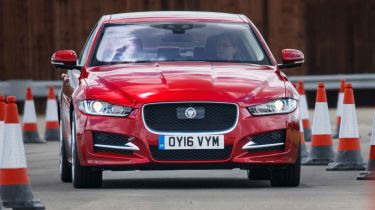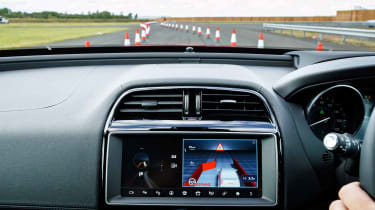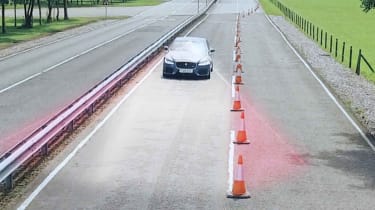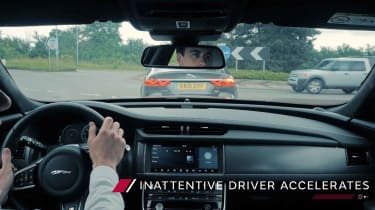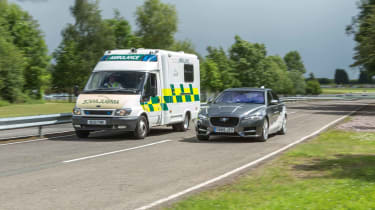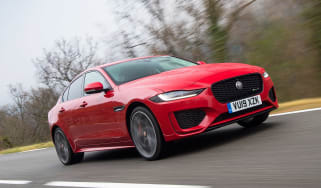Jaguar Land Rover to test autonomous tech on UK roads
British company will test self-driving and connectivity tech in the UK
Jaguar Land Rover is to begin testing a fleet of 100 cars on the roads around its bases in Coventry and Solihull in the West Midlands.
The first cars will appear on a 41-mile route later this year and will concentrate on vehicle-to-vehicle and vehicle-to-infrastructure communications. These allow cars to ‘talk’ to one another and with road signs, overhead gantries and traffic lights.
Car-to-car communication and data sharing will allow cars and drivers to work together to make manoeuvres such as lane-changing and negotiating junctions both “easier and safer”, according to Jaguar Land Rover.
The company’s head of research Tony Harper said: “Our connected and automated technology could help improve traffic flow, cut congestion and reduce the potential for accidents. We’ll also improve the driving experience, with drivers able to choose how much support and assistance they need. In traffic, for example, the driver could choose autonomy assist during tedious or stressful parts of the journey.
“But even when an enthusiastic driver is fully focused on enjoying the thrill of the open road, the new technology we are creating will still be working in the background to help keep them safe. Because the intelligent car will always be alert and is never distracted, it could guide you through roadworks and prevent accidents.”
Initially, the programme is concentrating on four separate systems, called Roadwork Assist, Safe Pullaway, Over-the-Horizon Warning and Emergency Vehicle Warning.
The first of these, Roadwork Assist, uses cameras in stereo to create a 3D image of the road ahead. Combined with image-processing software, the system can recognise traffic cones and barriers and determine the ideal path through complicated roadworks and contraflows.
This has the potential to reduce congestion, improve traffic flow and ease driver stress. It does this by applying a small amount of steering assistance to keep you in the centre of narrow lanes. Harper said that with further research, this technology could allow Jaguar Land Rover vehicles to navigate their way through roadworks autonomously.
Safe Pullaway uses the same camera system as Roadwork Assist to monitor the area just in front of the car. If it detects an obstacle, it won’t allow the car to move off. It’ll also automatically apply the brakes if it thinks a collision will take place, while the driver will get an audible warning, too. There’ll also be a system called Over-the-Horizon Warning that can detect cars out of your sight using radio waves. This includes cars around a blind bend or over the crest of a hill.
According to Harper, such a system would “make driving safer and could help prevent traffic jams and accidents. Providing the right information at the right time will enable better and safer decision-making, whether the car is driven by a human or is autonomous.”
If the system detects a car has stopped or will be an obstacle to other motorists, the car will send a ‘Hazard Ahead’ signal to other nearby motorists, giving them an audio and visual warning.
Lastly, the company is also developing an Emergency Vehicle Warning system that’ll let you know from which direction a connected ambulance, fire brigade or police vehicle is coming from. This will help you determine if you need to get out of the way – and when.
The tests will be taking place on real roads around the West Midlands, following a 41-mile route covering motorways and urban roads. First vehicles will begin appearing later this year. As yet, there’s no indication as to when or if this technology will appear on production cars, but we don’t expect to see it before 2018 at the earliest.
Recommended

New Land Rover Defender Sport spotted and it’s an electric baby SUV
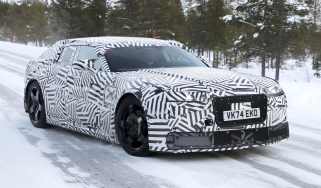
New Jaguar Type 00 snapped testing ahead of 2025 reveal

Jaguar Type 00 concept revealed: a bold electric future for the British brand
Most Popular

Omoda E5 targets rivals: now with zero deposit and APR
Tips & advice

Car dashboard warning lights: what does each symbol mean?

Electric car charging stations: public networks, charger types, apps and maps

